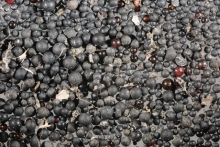Ballast water release from ocean vessels has introduced hundreds of invasive species to coastal ecosystems worldwide, causing major disruptions to fisheries and biodiversity. Attempts to control aquatic invasions have met with mixed success in general. However, a new study suggests that a bi-national regulation targeting ships entering the Great Lakes since the mid-2000s has been remarkably effective in reducing a large proportion of the invasive species in the world’s largest freshwater ecosystem.


The search of life beyond our world is an exciting venture that may yield an enormous discovery in the not-too-distant future. However, space agencies around the world, including NASA and the European Space Agency, have long been aware of the potential risks of biological contamination and have set in place planetary protection policies.

As the global community is called to re-examine our relationship to the natural world, one thing is certain: despite all our technological advances, humans are completely dependent on healthy and vibrant ecosystems for water, food, medicines, clothes, fuel, shelter, and energy, just to name a few. The 2021 theme, “We’re part of the solution”, was chosen to be a continuation of the momentum generated last year under the over-arching theme, “Our solutions are in nature”, which served as a reminder that biodiversity remains the answer to several sustainable development challenges.

May 22 is International Day for Biological Diversity. As the global community is called to re-examine its relationship to the natural world, one thing is certain: despite all our technological advances we are completely dependent on healthy and vibrant ecosystems for our water, food, medicines, clothes, fuel, shelter and energy, just to name a few. The 2020 theme “Our solutions are in nature” emphasizes hope, solidarity and the importance of working together at all levels to build a future of life in harmony with nature.

The Great Lakes have been invaded by more non-native species than any other freshwater ecosystem in the world. In spite of increasing efforts to stem the tide of invasion threats, the lakes remain vulnerable, according to scientists from McGill University and colleagues in Canada and the United States.

A team of researchers from McGill University and the Quebec government have discovered microplastics (in the form of polyethylene 'microbeads,' less than 2 mm in diameter) widely distributed across the bottom of the St. Lawrence River, the first time such pollutants have been found in freshwater sediments.

Phys.org | Sept. 18, 2014
A team of researchers from McGill University and the Quebec government have discovered microplastics (in the form of polyethylene 'microbeads', <2 mm diameter) widely distributed across the bottom of the St. Lawrence River, the first time such pollutants have been found in freshwater sediments.
